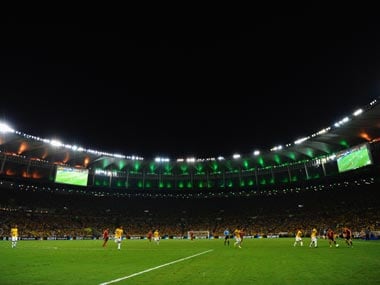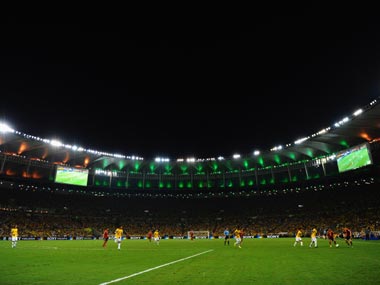Rio de Janeiro: The colours are alive even before entering the Maracanã. Supporters are practicing their chants and displaying their teams’ jerseys proudly. There is something else in the air too, a kind of quiet expectation, as we walk up the ramp to see the remodelled stadium. The new roof was alight, grandiose, showing off as newcomers looked around to see the changes. New seats, a sturdy roof, four big screens and a crisp, well-kept field. Last Sunday, 21 July, carioca football fans ‘mataram a saudade’ with a Brasileirão match between Fluminense and Vasco after three years of stadium remodelling. The Brazilian phrase is perhaps unique to the language and means reuniting after a long absence, and killing the feeling of nostalgia, swapping it for the real thing. And after having international teams play in the stadium first, local Rio de Janeiro teams finally got to play in their home. Amidst protests against the 2014 World Cup and the spending of incredible amounts of money on the building of stadium the real question to football fans from Rio de Janeiro is – was it all worth it? After three years of wait is the Maracanã any better than it used to be? [caption id=“attachment_982561” align=“alignleft” width=“380”]
 The Maracana, in all its glory. Getty Images[/caption] Though the crowd for both teams was thundering throughout, the Maracanã seemed more silent than usual. Prices for the empty seats were priced at R$300 (about £90) which is around half the minimum wage – the seats behind the goal were R$60, with concession standing at R$30. The side-line seats of the stadium were nearly empty. Apart from a few people who looked quite lonely, the side bleachers stood embarrassingly barren in comparison to those behind the goals, where the cheaper seats were located. The Maracanã consortium issued a statement explaining that they held back 18,000 tickets, which might explain the lack of attendance. This means that only about 60,000 tickets were up for sale. However this does not change the fact that the tickets for the side-line bleachers were too expensive for the average Brazilian. “The service [in the stadium] has changed, it is better. This sector [behind the goal], I didn’t find it expensive,” says Fluminense fan Fernando, 26. “I paid R$30 (£10) because I am part of the Fluminense club. But other sectors are more expensive and for Brazil’s reality that’s too expensive, that’s not most people’s reality.” Official numbers reveal that 34,634 tickets were bought, but that 46,860 people attended the match. This is due to gratuities given to children and senior citizens. The total ticket revenue was R$ 1.5 million. Fifa released prices for World Cup tickets last week and it was revealed that Brazilian nationals who are students, seniors or members of social programs will have concession when buying tickets. This means that the lowest Brazilian nationals ticket stands at R$30 (£9) but despite this prices are still out of reach for most Brazilians. There was no indication as to how many of these cheaper tickets will be made available and though concessions might help some, the Brazilian people live in such misery that students, seniors and social program members are not the only people who need discounts. Fifa also announced that tickets for foreigners will be 10% more expensive than they were in the South Africa World Cup in 2010. Though the World Cup is important to the whole world the only opinion that really matters is that of the people who will keep the event’s legacy. The price of the least expensive seats in the Maracanã have increased 30 times in eight years and the World Cup will only increase these prices because of the stadium’s privatization. In a city where misery is constant, high prices mean less people will show up. The price was not the only thing that changed. The vast new roof that covers 95% of the seats glowed with the lights of the field and towered over the fans that curiously inspected the modern gizmo. The new seats are baby blue and yellow – perhaps a reference to Brazil colours – and remarkably comfortable in comparison to the old decrepit ones. The four huge screens placed in the four corners of the stadium failed to inform the crowd of many happenings on the field. When Fred was sent off in the first twenty minutes of the game it was difficult to tell what went on, and there was no information as to the added time. Football supporters have also complained about the attempts to change the style of cheering in the stadiums. After a failed attempt to forbid drums, samba and flags from the Maracanã, the fans were presented with a half-time show that was booed. Fluminense supporter Sophie, 22, explained that the experience was different from what it used to be for all who attended the match. “The people were extremely opposed to the entertainment being offered, as it is not a common tradition in South American football. The presence of the DJs and party presenters even led several Fluminense supporters to boo the entertainers and the songs played. Many people at the match criticized the ‘showmanship’ aspect of the experience. “The experience that Brazilians once knew of going to football matches and feeling the power of the mass of supporters cheering on their team has morphed into expensive tickets and a theatre like aspect to the whole event.” Though the stadium looks more modern and safer, it seems that Brazilians have lost the football factor they find essential in matches: the atmosphere. Though it might be said that the Maracanã is the heart of Brazilian football that is only true if there are supporters to pulse, jump and cheer inside it to make it beat. And if the price we have to pay for the World Cup is the loss of that beat, perhaps it was not worth it.
The Maracana, in all its glory. Getty Images[/caption] Though the crowd for both teams was thundering throughout, the Maracanã seemed more silent than usual. Prices for the empty seats were priced at R$300 (about £90) which is around half the minimum wage – the seats behind the goal were R$60, with concession standing at R$30. The side-line seats of the stadium were nearly empty. Apart from a few people who looked quite lonely, the side bleachers stood embarrassingly barren in comparison to those behind the goals, where the cheaper seats were located. The Maracanã consortium issued a statement explaining that they held back 18,000 tickets, which might explain the lack of attendance. This means that only about 60,000 tickets were up for sale. However this does not change the fact that the tickets for the side-line bleachers were too expensive for the average Brazilian. “The service [in the stadium] has changed, it is better. This sector [behind the goal], I didn’t find it expensive,” says Fluminense fan Fernando, 26. “I paid R$30 (£10) because I am part of the Fluminense club. But other sectors are more expensive and for Brazil’s reality that’s too expensive, that’s not most people’s reality.” Official numbers reveal that 34,634 tickets were bought, but that 46,860 people attended the match. This is due to gratuities given to children and senior citizens. The total ticket revenue was R$ 1.5 million. Fifa released prices for World Cup tickets last week and it was revealed that Brazilian nationals who are students, seniors or members of social programs will have concession when buying tickets. This means that the lowest Brazilian nationals ticket stands at R$30 (£9) but despite this prices are still out of reach for most Brazilians. There was no indication as to how many of these cheaper tickets will be made available and though concessions might help some, the Brazilian people live in such misery that students, seniors and social program members are not the only people who need discounts. Fifa also announced that tickets for foreigners will be 10% more expensive than they were in the South Africa World Cup in 2010. Though the World Cup is important to the whole world the only opinion that really matters is that of the people who will keep the event’s legacy. The price of the least expensive seats in the Maracanã have increased 30 times in eight years and the World Cup will only increase these prices because of the stadium’s privatization. In a city where misery is constant, high prices mean less people will show up. The price was not the only thing that changed. The vast new roof that covers 95% of the seats glowed with the lights of the field and towered over the fans that curiously inspected the modern gizmo. The new seats are baby blue and yellow – perhaps a reference to Brazil colours – and remarkably comfortable in comparison to the old decrepit ones. The four huge screens placed in the four corners of the stadium failed to inform the crowd of many happenings on the field. When Fred was sent off in the first twenty minutes of the game it was difficult to tell what went on, and there was no information as to the added time. Football supporters have also complained about the attempts to change the style of cheering in the stadiums. After a failed attempt to forbid drums, samba and flags from the Maracanã, the fans were presented with a half-time show that was booed. Fluminense supporter Sophie, 22, explained that the experience was different from what it used to be for all who attended the match. “The people were extremely opposed to the entertainment being offered, as it is not a common tradition in South American football. The presence of the DJs and party presenters even led several Fluminense supporters to boo the entertainers and the songs played. Many people at the match criticized the ‘showmanship’ aspect of the experience. “The experience that Brazilians once knew of going to football matches and feeling the power of the mass of supporters cheering on their team has morphed into expensive tickets and a theatre like aspect to the whole event.” Though the stadium looks more modern and safer, it seems that Brazilians have lost the football factor they find essential in matches: the atmosphere. Though it might be said that the Maracanã is the heart of Brazilian football that is only true if there are supporters to pulse, jump and cheer inside it to make it beat. And if the price we have to pay for the World Cup is the loss of that beat, perhaps it was not worth it.
Journalist, blogger and Brazilian. Nicole writes regularly about politics, culture, current events, feminism and pop culture. She is an avid Twitter user and doesn't shy away from speaking her mind.
)